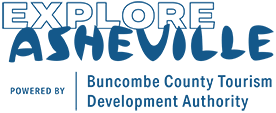By Stephanie Brown, President & CEO of Explore Asheville
You may have heard that the Buncombe County Tourism Development Authority (BCTDA) voted on October 30 to support the second annual Chow Chow nonprofit culinary event with a sponsorship of $100,000, using ExploreAsheville.com advertising revenue set aside for community events.
Chow Chow attracted national talent and recognition, hosted 3,200 attendees, stimulated $2 million in local business spending, generated $136,000 in local tax revenue, and provided a $53,000 contribution to MANNA Food Bank. Chow Chow was enjoyed by locals (66%) as well as visitors. The event achieved an impressive $1.3 million worth of earned coverage in national media outlets and an amazing 2.8 million social media impressions.
Approval of the $100,000 sponsorship for 2020 Chow Chow was opposed by a member of the BCTDA board who raised legitimate questions. We commend this board member for exercising his oversight responsibility and we regret the lack of clarity in the preparation for the meeting and the explanations that were provided during the meeting.
We would like to take this opportunity to provide additional information, including the full report of event fund transactions for three years, which was requested following the meeting.
As a public entity, the BCTDA board of directors and staff take seriously our commitment to transparency and clarity (efforts praised last spring by Mountain Xpress). And, as a reminder, we provide full information, including all financials here on this website, both in advance and following board meetings. We welcome community comments and questions.
Background on the Establishment of the Festival and Cultural Event Grant Program
In March 2014, the BCTDA approved the integration of paid advertising on ExploreAsheville.com, which generated a source of revenue not subject to occupancy tax legislative mandates. This earned income has been allocated to the support and sustainability of local events, as a form of tourism development that also helps to sustain community culture.
At its inception, the Earned Revenue Fund was expected to generate about $50,000 per year for community events. As explained below, revenue has exceeded those projections, enabling the funding of local festivals and cultural events at a higher level.
This revenue is reported on the monthly financial statements on the Balance Sheet and on the Income Statement.
Transitions in Accounting Systems
Questions arose at the October BCTDA board meeting about accounting procedures for the Earned Revenue Fund, which is understandable, given that Explore Asheville has operated under three different accounting systems in the last four years. Annual audits have demonstrated rigor in financial practices and the accuracy of financial statements during these transitions.
- FY 2014-15 through FY 2016-17: The Asheville CVB was a department of the Asheville Area Chamber of Commerce and was under a combined Chamber/Buncombe County Finance accounting structure known as Lawson.
- FY 2017-18 – from July 1, 2017 through March 31, 2018: Explore Asheville became an independent entity on July 1, 2017 and functioned solely under Buncombe County Finance’s Lawson accounting structure for the first nine months of the fiscal year.
- FY 2017-18 – April 1, 2018 through June 30, 2018: Buncombe County Finance switched from Lawson to a system called Workday mid-year on April 1, 2018, so the last three months of the fiscal year were under the new Workday accounting structure.
- FY 2018-19 to present: Full fiscal year budgets are administered using the Buncombe County Finance/Workday accounting structure.
The transitions from one accounting system to another, and then another, were reported to the board with explanations of challenges associated with these changes.
An Overview of the Earned Income Fund’s Actual Revenues and Expenditures
The first page of the accounting document includes the following summary of the Fund’s actual revenues and expenditures by fiscal year through FY 2018-19, followed by a line item detail by fiscal year.
The $176,223 highlighted balance in the summary represents FY 2018-19’s ending balance for Explore Asheville’s last fiscal year, closed June 30, 2019. The year-end financial statements will be presented with the audit at the November meeting of the BCTDA. The FY 20 column shows what was budgeted for fiscal year 2020.
The year-end financial statements have been audited and will be presented to the BCTDA at the November board meeting by Clifton Larson Allen LLP. These financial statements were not available when the vote in question took place. However, when compared to the ending balance arrived at in the summary above ($176,223), the audited financial statements and summary matched exactly.
Based on this thorough review, and the summary numbers aligning with the audited financial statements, we are confident that the Earned Revenue Fund balance numbers are correct.
Based on the summary above, starting with the FY 2018-19 ending balance of $176,223, add in the FY 2019-20 revenues, and fund balance allocation, less budgeted expenditures, a balance of $168,223 in the Fund is anticipated.
This amount will, of course, be adjusted to account for the $101,500 approved for Chow Chow and the Festivals and Cultural Events grants [link to https://www.ashevillecvb.com/20-local-festivals-and-cultural-events-receive-funding-from-buncombe-county-tda/] approved at the October 30 BCTDA meeting, bringing an anticipated undesignated balance in the Fund to $66,723 at year-end.
An Open Invitation to Contact Us with Questions or Concerns
As a public authority established for the public good, we take a great deal of pride in our work and our responsibility to the people of Buncombe County. The BCTDA was established to strengthen the local economy by attracting visitors who spend money at local businesses, creating jobs for residents, generating tax revenue that provides services, and funding facilities for the use and enjoyment of people in Buncombe County.
We invite you to reach out to us any time there are questions or further clarification is needed.
